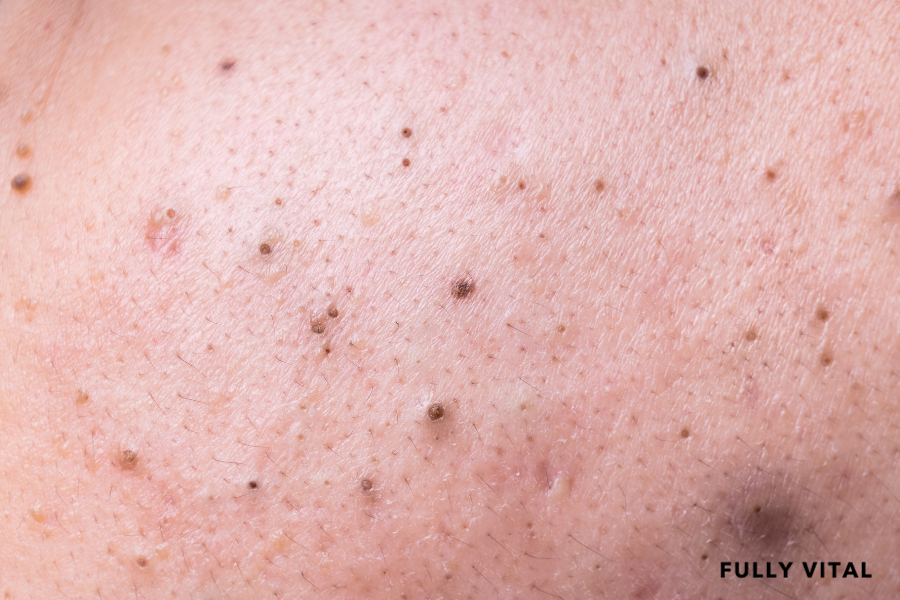
Dealing With Trichostasis Spinulosa: Tips For Relief And Recovery
Trichostasis spinulosa is a hair follicle condition that may be unfamiliar to many but can cause significant distress to those affected.
Characterized by the appearance of black dots on the hair follicles, primarily on the nose, cheeks, and forehead, trichostasis spinulosa occurs when multiple hairs became trapped within a single follicle.
If you're dealing with this condition and seeking relief and recovery, this article provides practical tips in alignment with Fully Vital's natural and health-conscious approach to hair care.
Discover the secret to unlocking your hair's full potential with Fully Vital's range of natural hair growth products.

I LOVE MY HAIR NOW
FullyVital hair serum and hair vitamins made tremendous improvements in my hair. I truly love my hair now.
Shop Hair ProductsUnderstanding Trichostasis Spinulosa
Trichostasis spinulosa is a relatively common but often misdiagnosed hair disorder where clusters of vellus hairs become entrapped within a single hair follicle.
This trapping leads to the formation of blackheads or pinhead-sized dark spots on the skin that can be mistaken for blackheads.
It is not a form of alopecia; instead, it's a keratinization disorder affecting the hair follicle.
Although it's more cosmetic than harmful, it can cause aesthetic concerns and distress.
Persons of any age or gender can be affected, though it's more prevalent in the elderly.
Signs And Symptoms Of The Condition
The hallmark sign of trichostasis spinulosa is the presence of small dark spots on the skin's surface, resembling blackheads.1
These spots are most common on oilier areas of the skin, such as the nose, cheeks, or forehead.
Affected individuals may notice an increased number of these spots over time, and they can sometimes be accompanied by a sandy or gritty feeling.
There is usually no pain or physical discomfort associated with the spots, but they may lead to psychological distress due to their appearance.
Unlike acne, these spots do not become inflamed or pus-filled.

Managing Symptoms With Proper Skincare
Trichostasis spinulosa is a common but often underdiagnosed skin condition characterized by the accumulation of hair follicles, typically on the nose or face.2
It can lead to symptoms like blackheads, rough or bumpy skin texture, and enlarged pores.
While it's not a serious medical condition, it can be bothersome and affect one's appearance.
Managing trichostasis spinulosa typically involves a combination of skincare and, in some cases, medical treatments.
Here are some steps you can take to manage its symptoms with proper skincare:
Gentle Exfoliation Techniques
For individuals struggling with trichostasis spinulosa, gentle exfoliation can help free the trapped hairs and clear the follicles.
It is important to avoid harsh scrubs or abrasive procedures that could damage the delicate skin barrier.
Instead, consider using a soft, natural exfoliant, such as a konjac sponge or a product containing fruit enzymes, which gently dissolve dead skin cells without causing irritation.
Fully Vital may recommend natural, gentle exfoliants that align with their commitment to vegan, cruelty-free hair and skincare products.
Consistency with exfoliation, about two to three times a week, is key to seeing improvement.
Moisturizers And Non-Comedogenic Products
Keeping the skin well-moisturized is crucial in managing trichostasis spinulosa because dry skin can exacerbate the accumulation of keratin in the follicles.
Utilize moisturizers that are non-comedogenic to prevent further clogging.
Products containing natural ingredients like aloe vera or hyaluronic acid can provide hydration without irritating the skin or adding to the blockages.
Fully Vital's philosophy on using chemical-free, natural products would support the use of clean beauty moisturizers that respect the integrity of the skin.
Moreover, always patch-test new products to ensure they do not trigger sensitivity or allergic reactions.
Protective Measures Against Environmental Factors
Environmental factors like UV rays and pollution can contribute to skin issues, including trichostasis spinulosa.3
Protection from the sun with a broad-spectrum sunscreen can prevent further skin damage and exacerbation of hair follicle issues.
Wearing hats and seeking shade during peak sun hours are also effective protective measures.
Anti-pollution skincare products, which are often rich in antioxidants, can shield the skin from harmful pollutants that may worsen skin conditions.
As Fully Vital values the rejuvenating power of natural ingredients, recommending products with green tea extract or vitamin C could be beneficial in this context.
Advanced Treatments And Interventions
While the skincare and management tips mentioned earlier can help with trichostasis spinulosa, some advanced treatments and interventions may be considered for more severe or persistent cases.
It's essential to consult a dermatologist to discuss these options and determine the most suitable approach for your specific condition.
Here are some advanced treatments and interventions:
Consultation With A Dermatologist
While trichostasis spinulosa is typically not harmful, consulting with a dermatologist is advisable, especially for persistent or distressing cases.
A dermatologist can properly diagnose the condition, differentiate it from similar skin issues, and provide targeted treatment options.
Treatments can include retinoids, which increase cell turnover, or hair removal techniques to address the trapped hairs.
Since Fully Vital encourages scientific innovation and safe interventions, advice from a medical professional would align with their ethos of informed and effective care.
Possible Medical Procedures
In certain cases, dermatologists may recommend medical procedures to help alleviate the symptoms of trichostasis spinulosa.
These can include laser therapy, which targets and removes the entrapped hairs, or chemical peels that deeply exfoliate the skin.
It's essential to discuss these options thoroughly with a healthcare provider to understand the potential risks and benefits.
Fully Vital would likely support the integration of natural hair growth products and vitamins that can complement these procedures to maintain overall hair and skin health.

Promoting Healthy Skin And Hair Naturally
Supporting skin and hair health holistically involves a combination of lifestyle practices, dietary choices, and natural remedies that promote overall well-being. Here are some holistic approaches to maintaining healthy skin and hair:
Nutritional Support For Hair And Skin
Nutrition plays a vital role in the health of your skin and hair.
A diet rich in vitamins and minerals can fortify skin resilience and promote healthy hair growth.
Foods high in omega-3 fatty acids, antioxidants, and biotin are especially beneficial.
Fully Vital's hair growth vitamins can also complement a balanced diet, providing additional support from within and potentially improving conditions like trichostasis spinulosa by promoting overall hair health.
Stress Management Techniques
Stress can negatively impact skin and hair, potentially exacerbating conditions like trichostasis spinulosa.
Employing stress management techniques such as mindfulness, meditation, or yoga can help reduce stress-related harm to the body.
Fully Vital's holistic approach to hair care recognizes that managing stress is an integral part of nurturing both skin and hair health, promoting a mindset that values self-care and relaxation as part of the healing journey.
Incorporating Hair Growth Serums
A hair growth serum, particularly one that is naturally formulated without harmful chemicals, can encourage healthy hair growth and improve the condition of the scalp and hair follicles.
Fully Vital's hair growth serum, for instance, uses a blend of natural, scientifically-backed ingredients that could help in cases where hair conditions impact the scalp.
Regular application as directed can promote healthy hair growth while aligning with a natural, vegan approach to wellness.
Discover the Power Of Fully VitalAre you tired of dealing with thinning hair and the signs of aging? Look no further than Fully Vital. Our hair growth products are designed to address all your hair concerns, from thinning to loss of volume and overall vitality. Here are some of the key features and benefits of our products:
Ready to take control of your hair's health and vitality? Try Fully Vital today and experience the difference for yourself. |
Final Thoughts On Trichostasis Spinulosa
Dealing with trichostasis spinulosa can be frustrating and challenging, but there are steps you can take to find relief and promote recovery.
Remember, it's essential to consult with a dermatologist or healthcare professional to develop a personalized treatment plan that suits your unique needs.
Whether it's through topical treatments, lifestyle adjustments, or medical intervention, there are options available to address trichostasis spinulosa.
At Fully Vital, we understand the importance of healthy, thriving hair, and our science-backed products are designed to support your hair growth journey.
Our mission is to provide powerful solutions that can help slow down and reverse the aging of your hair, so you can enjoy vibrant, resilient locks.
With the right care and attention, you can manage trichostasis spinulosa and nurture your hair back to optimal health.
Check out our recent blogs:
- Unlock Radiant Locks: Apple Cider Vinegar Hair Rinse Guide
- Maximizing The Lifespan Of Brow Lamination: Tips And Insights
- Hair Donation: Giving Hope And Confidence To Others
Frequently Asked Questions on Trichostasis Spinulosa
What causes Trichostasis Spinulosa?
Trichostasis Spinulosa is caused by hair follicles becoming clogged with trapped hairs.
This blockage results in the formation of tiny bumps on the skin, especially on the face.
Who is most likely to get Trichostasis Spinulosa?
Anyone can get trichostasis spinulosa, but it is more common in adults with thick, coarse hair and those who have undergone prolonged sun exposure.
Is Trichostasis Spinulosa hereditary?
Trichostasis Spinulosa is not hereditary and is mainly related to the structure and characteristics of hair follicles.
Can Trichostasis Spinulosa be prevented?
It can be prevented by practicing good hair and skin hygiene, using gentle exfoliation, and avoiding activities like shaving or waxing that may exacerbate the condition.
What are the treatments available for Trichostasis Spinulosa?
Treatment options include gentle exfoliation, topical retinoids, and in some cases, laser hair removal.
Consult a dermatologist for personalized treatment recommendations.
Is Trichostasis Spinulosa curable?
Trichostasis Spinulosa can be managed and controlled with appropriate treatment and lifestyle adjustments, but it may not be completely curable.
Is Trichostasis Spinulosa contagious?
No, Trichostasis Spinulosa is not contagious.
It is a non-infectious skin condition.
How long does Trichostasis Spinulosa last?
The duration of Trichostasis Spinulosa varies from person to person.
With proper treatment and care, the condition can improve over time.
Does Trichostasis Spinulosa affect hair growth?
Trichostasis Spinulosa does not directly affect hair growth, but it can lead to the appearance of tiny bumps on the skin due to trapped hairs.
Can Trichostasis Spinulosa recur after treatment?
Yes, Trichostasis Spinulosa can recur even after successful treatment.
It is important to maintain good skin hygiene and follow your dermatologist's recommendations to minimize the risk of recurrence.
Sources:
- Sardana, K. (2014). Follicular disorders of the face. Clinics in Dermatology, 32(6), 839–872. https://doi.org/10.1016/j.clindermatol.2014.02.024
- Baykal, C., & Yazganoglu, K. D. (2010). Dermatological Diseases of the Nose and Ears: An Illustrated Guide. In Google Books. Springer Science & Business Media. https://books.google.com.ph/books?hl=en&lr=&id=v_7luKMoUxEC&oi=fnd&pg=PA1&dq=Trichostasis+spinulosa+is+a+common+but+often+underdiagnosed+skin+condition+characterized+by+the+accumulation+of+hair+follicles
- Clinicoepidemiological and Treatment Outcome of Various Topical Modalities in Acne Vulgaris - ProQuest. (n.d.). Www.proquest.com. Retrieved December 22, 2023, from https://www.proquest.com/openview/39f9006aa24a79d1e63619083d25b3fe/1?pq-origsite=gscholar&cbl=2026366&diss=y







